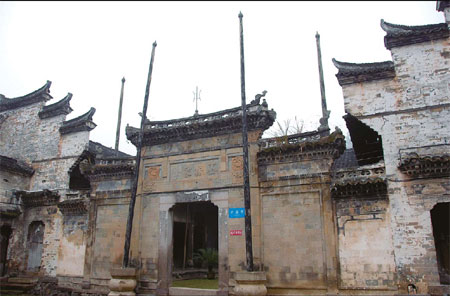Dreams come true in Yuyuan
By Bian Yi (China Daily)
Updated: 2010-08-27 10:57
 |
Large Medium Small |
 |
|
Yuyuan's ancient houses feature spacious yards, tall fire walls and |
One of the best-preserved and non-touristy villages can be found in the Wuyi Mountains, Bian Yi reports.
Of all the ancient towns and villages in Zhejiang province, the most impressive to many is Yuyuan - the only village in China with a layout based on the principles of tai chi and Taoist astrology.
Related readings:
Nestled in the Wuyi Mountains, Yuyuan features large and completely preserved ancestral halls and elegant temples, all characterized by folk culture and exquisite wood-carved decoration.
 What's on in Shanghai
What's on in Shanghai Beauty and the pavilion
Beauty and the pavilion At leading edge of new materials
At leading edge of new materials
Yuyuan's elaborate village layout from ancient times remains intact, presenting its untouched historical beauty with blocks of grand houses and big yards.
The layout, representing tai chi and Taoist astrology, was created by Liu Bowen, a famous official in the early Ming Dynasty.
Yuyuan was located in a typical mountainous area with little flat ground and, at the time, had only one creek as the main water source. Liu decided to change the course of the creek into an S-shape and plant trees on both banks, thus reserving more water for farming and preventing drought and floods.
The S-shape creek twists through the village, dividing Yuyuan into two parts, similar to the yin and yang symbol of tai chi. What's more, Liu arranged seven ponds along the creek in an astrological pattern similar to the seven stars of the Big Dipper - the Big Dipper is very important in Taoist astrology. This design helped to supplement Yuyuan's water supply. All the public buildings were then built around these ponds.
Yuyuan still maintains 41 ancient houses with 1,072 rooms in all, most of which were built in Qing Dynasty. An ancient stage from the Ming Dynasty, a slab bridge from the Qing Dynasty, and two stone-arch bridges and ancient trees can also be found in the village.

Fortunately, large-scale tourism development hasn't arrived in the village, which is almost devoid of tourism companies and souvenir shops, leaving Yuyuan in an almost pristine condition.
It is also a cheap place to visit, with only two historical sites charging an admission fee.
Visits to Yushizong Hall (entrance fee 5 yuan) and Dongzhu Temple (entrance fee 2 yuan) are definitely worth the entry price. With three entrances and two grand yards, Yushizong Hall (the ancestral hall of the Yu family) is one of the largest ancestral halls in Zhejiang province. Its yards are nearly big enough for a game of football. Although the gates of the hall are not elaborately decorated, you will be overwhelmed by the grand yards once inside.
Dongzhu Temple (temple of the cave host) boasts not only scenic spots but also romantic legends and dreams. With two limpid creeks at the front, the temple nestles at the foot of a hill covered with luxuriant trees. An ancient camphor tree next to a small ancient stone bridge is at the foot of the temple, while the red-walled Dongzhu Temple blends beautifully into the picturesque landscape.
Legend says that everyone who stays in Dongzhu Temple overnight will dream and these dreams will come true. On Jan 13 and June 26, the temple holds the Festival of Dream Fulfilling, during which hundreds of local people and tourists sleep in the temple so as to fulfill their dreams.
In the past, local people dreamed for a rain to nourish their crops. Legend has it that every year between June 25 and 27, rain falls without fail, even during drought years. Today, traditional rituals and celebrations continued but the dream fulfillments have become more varied.
Dongzhu Temple was built during the Southern Song Dynasty to worship Li Bing, the God of Water. Li Bing constructed the famous Doujiang Weir in 256 BC, which is still in use today.
Besides visiting these two historical sites, strolling down the paths of the village and admiring villagers' ancient houses is also a worthwhile pursuit. Yuyuan's typical residential buildings are characterized by open and spacious yards, tall fire walls and, most importantly, elaborate wood-carved decoration. Beams, pillars, windows, doors, arches - almost every wood structure of a house - are decorated with exquisite wood carvings shaped into flowers, grass, fish, insects and figures, or even terraces and pavilions. What's more amazing is that some carving's colors (such as carvings in Shengyuan Hall) change with seasons from black to yellow to red. From these ornaments, visitors get the feeling of the extravagant lifestyles of the rich once living there. Yuyuan was once an important commercial town.
These days these grand houses are occupied by ordinary villagers, but visitors can enter and fully appreciate the sumptuous furnishings of these houses. Watching local people going about their daily tasks, while old men smoke old-fashioned Chinese pipes, you will be soon immersed in a world free of city turmoil and the development of modern society.